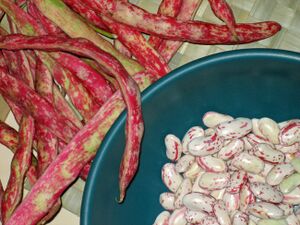Pinto beans
The pinto bean or mottled bean (Spanish: frijol pinto, literally "painted bean") is named for its mottled skin (compare pinto horse), hence it is a type of mottled bean. It is the most common bean in the United States and northwestern Mexico , and is most often eaten whole in broth or mashed and refried. Either whole or mashed, it is a common filling for burritos. The young pods may also be used as green beans.

In the southwest United States, the pinto bean is an important symbol of regional identity, especially among Mexican Americans. Along with the chilli, it is one of the official state vegetables of New Mexico (under the name frijol). The prepared beans are commonly known as frijoles. This type of bean is also referred to as "Cowboy Beans" in Texas, all along the Mexican border and wherever Mexican cowboys were employed. In areas where Mexican cowboys did not travel on the trails north from Texas, it was probably not known.
This is the most commonly used bean used for refried beans (fresh or canned) and in many dishes at Tex-Mex restaurants. Rice and pinto beans served with cornbread or corn tortillas are often a staple meal where there is limited money for meat, as the combination of beans and corn creates all the protein amino acids needed in a meat substitute. When it comes to making chili, if a bean is added, this is the one typically used, although the kidney bean, black bean, and many others may also be used in other locales.
Pinto bean varieties include:
- Burke
- Othello
- Maverick
- Sierra
The alubia pinta alavesa, or the "Álava pinto bean", is a red variety of the pinto bean which originated in Añana, a town and municipality located in the province of Álava, in the Basque Country of northern Spain. In October, "la Feria de la alubia pinta alavesa" (the fair of the Alubia pinta alavesa) is celebrated in Pobes.
Pinto beans look the same as cranberry and borlotti beans, but differ in taste.
How to cook pinto beans in a pressure cooker
Use this basic guide if you do not have a specific recipe
- Pick through the beans and discard any discoloured beans or loose skins
- Soak in cold water for a minimum of the time shown, soaking overnight is usually the best way to achieve this
- Change soaking water a few times if possible
- Never cook the beans in the water they were soaked in
- Rinse the beans well at the end of the soaking period
- Ensure the pressure cooker is at least a quarter full
- Never fill the pressure cooker more than half full
- Always cover the beans with at least 5 cm (2") water
- Add 2 tablespoons of vegetable oil to the water - this reduces foaming
- Allow the pressure cooker to get to the required pressure and then begin timing
- Use the specified pressure release method - this is the natural method in the case of dried beans or pulses
- A bean is usually perfectly cooked when it can be easily squashed between your forefinger and thumb
- If the beans are not sufficiently cooked, return to pressure, cook for another 3 minutes and allow the pressure to reduce using the natural method.
- Check that the beans are cooked to your liking.
| Type of Bean | Cold Water Soak Time (minimum) | Pressure Cooking Time | Cooking Pressure High = 15 psi Med = 10 psi Low = 5 psi: |
Pressure Release Method |
|---|---|---|---|---|
| Dried Pinto or mottled beans | 4 hours | 12 minutes | High | Natural |
See also
- Instructions and pressure cooking times for more than 20 types of bean
- Detailed index and cooking information for more than 20 bean varieties
- Pressure cooking information and pressure cooking recipes
#pintobeans #pressurecooker #beans #mashed #naturalmethod #corntortillas #refriedbeans #rice #driedbeans #kidneybean #burritos